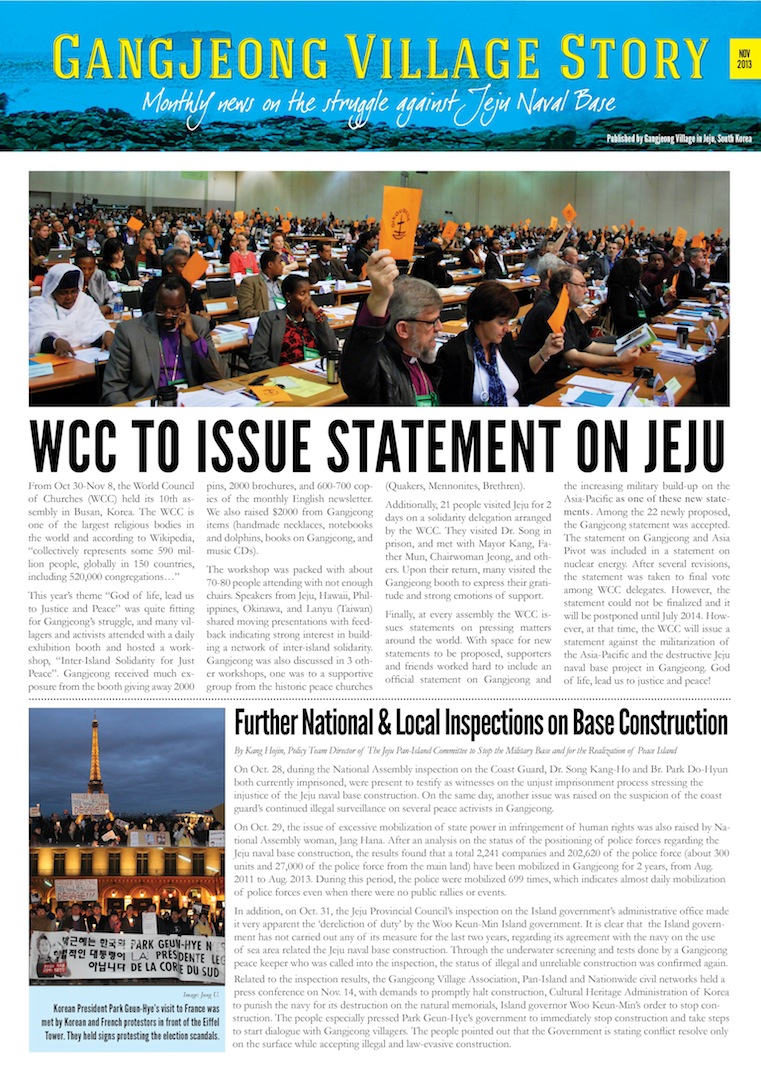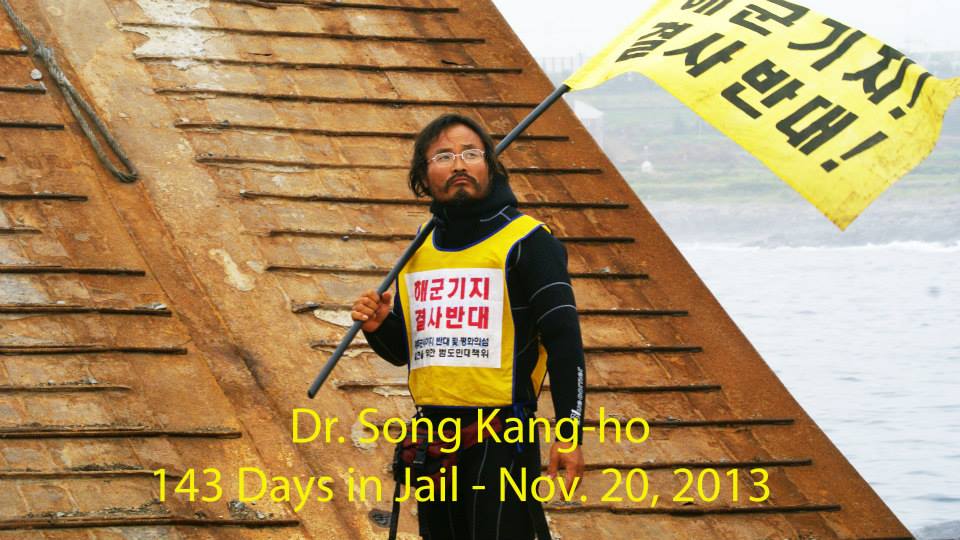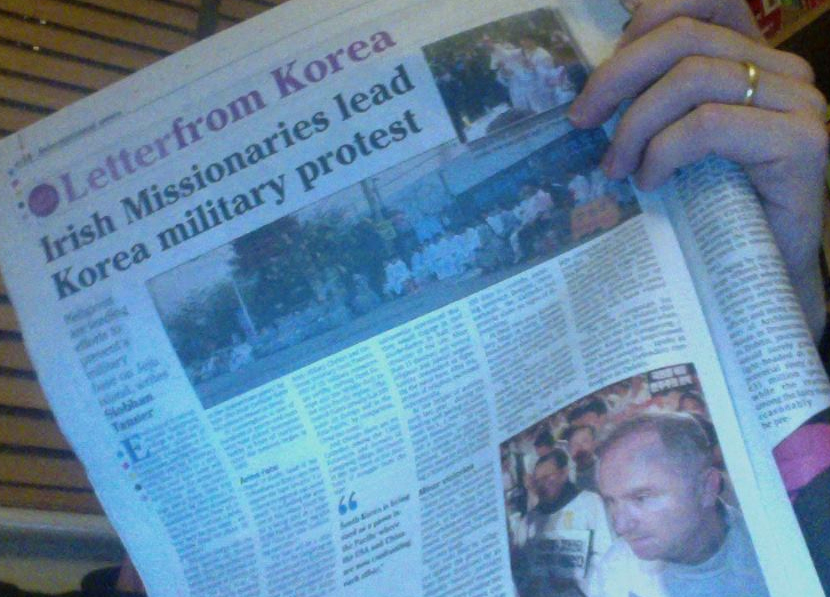In this month’s issue:
City of Berkeley passes Gangjeong Resolution, 2014 base budget issues, Love letter from Afghanistan, Milyang solidarity, Gangjeong Crochet Project, Solidarity from Germany, trial updates, and more!
Save Jeju Now
No War Base on the Island of Peace
Tag: international solidarity
-
Alchemy On Jeju Island
Reblogged with permission from: Alchemy On Jeju Island | by Koohan Paik *
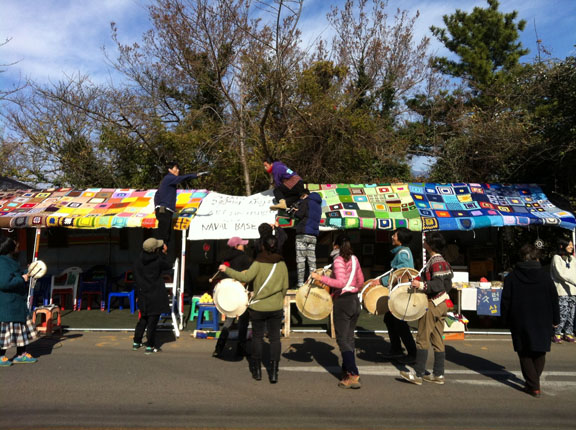
Gangjeong villagers and activists decorate the streets with colorful woolen squares knitted by supporters of the anti-base struggle. Traditional drummers play in the foreground. I recently spoke with two members of Veterans for Peace, who had become involved with Korea issues in only the past few years. Each of them came to know Korea through their support for the Gangjeong villagers who have been battling, for nearly eight years straight, construction of a huge, high-tech navy base being built on their Jeju-Island coastline. Both men said that before Jeju, their work with northeast Asia was Japan-centered, and that “no one ever talked about Korea.” But through their engagement with Gangjeong, they have learned about the April 3 massacre, about the unending Korean War, about the unprecedented tonnage of bombs that the U.S. levied upon the Korean people in the early 1950s, and about modern Korean history, in general. Today, they recognize that the Korean War was certainly as consequential in U.S. history as the war in Vietnam. It now perplexes them that Korea had been effectively erased from the books.
The sad truth is, the vast majority of even the most progressive Americans know very little about Korea, let alone that the U.S. has been at war with it for the past 60 years. Many don’t even know where Korea is. This absurd knowledge void presents a challenge so daunting for those working toward unification, that nothing short of alchemy would seem to hold any promise for peace on the peninsula.
On the other hand, it appears that the tragedy unfolding at Gangjeong village might offer just the sort of alchemy that could conjure Korea into the wider consciousness. Ecumenical groups, environmental groups, artists, lawyers, social workers, peace-studies groups, student groups, indigenous-rights groups, and food-sovereignty groups have all passed through the tiny village whose fame is now of global proportion. Numerous articles on the villagers’ plight have been published in Europe, South America, the Asia-Pacific and the U.S. Last summer, I was at the San Francisco airport with Gangjeong’s charismatic Mayor Kang Dong-kyun on his first foray outside of northeast Asia, when a woman behind him in line said, “Aren’t you Mayor Kang? From Gangjeong village?” It turned out she had studied Gangjeong as part of a peace-studies program in Virginia, and recognized him from internet videos. Little Gangjeong has put Korea “on the map” and affirms that the Korean War is indeed alive and well.
Then, in fall of 2013, the City of Berkeley, California, was the first city in the world to formally declare its support of the Gangjeong villagers in the form of a resolution opposing the navy base. Shortly thereafter, in Madison, Wisconsin, the National Board of Veterans for Peace passed a similar resolution to “Stop the Second U.S. Assault on Jeju Island.” The document not only describes what is at stake if the base project is allowed to proceed, but also gives historical context, such as the 1948 genocide on Jeju and how the ever-increasing militarization of Korea violates the 1953 Armistice. It reads like an overview of modern Korean history vis a vis the United States.
One of the most poetic declarations in support of the Jeju struggle was made by a group of Afghani peace activists based in Kabul who have established a Skype relationship with their counterparts in Gangjeong. They write: “We are confident that if ordinary Chinese or North Koreans ever gave you trouble, you would have tea with them, using your imagination and citizen diplomacy to calm the troubles, non-violent paths which are far more effective and kind, and a far better use of tax-payer money (it takes no tax-payer money to drink tea!) than the multi-million premises, personnel and war equipment.”
The global draw of the Gangjeong village struggle owes much to the fact that the land, water, heritage and culture at stake have already garnered international recognition. Gangjeong’s culture and environment have earned UNESCO designations. It is one of Korea’s few remaining traditional, indigenous villages; it contains some of Korea’s best farms and richest soil, its purest water and its haenyo diver tradition; its coast was home to Korea’s only pod of dolphins and one of the world’s finest, soft-coral forests (now being dredged); and its 1,900 residents practice authentic local democracy.
True, all these elements attract an international crowd. But the most enduring appeal of the humble village sits squarely in its remarkable community spirit. The community is comprised of an eclectic mix of villagers, clergy and Seoul activists, who strategize and carry out campaign after campaign. There are cooks, videographers, and kayakers who monitor environmental violations by construction crews. There are people setting up for “Hundred Bows” every morning, or for a music concert in the evening. There are people manning the Peace Center, ready to welcome new arrivals disembarked off the public bus steps away. There are people printing up information pamphlets to disseminate at any one of the big, international conventions that regularly take place on Jeju. It is no exaggeration to say that the village is as fueled on dynamic love as it is by donation.
Most recently, there have been scores of knitters – yes, knitters! – sitting crosslegged in the Peace Center for hours at a time, lashing together enormous woolen quilts in rainbow hues, out of over a thousand knitted squares sent to them by supporters from all over Korea. December 2013 in Gangjeong saw the streets festooned with the quilts, and even the skeletal trees were given cheery, colorful “sweaters” that fit snugly over their trunks and branches. The sight of this whimsical riot of color splashed across winter’s dreary landscape, in contrast with the phalanxes of stern and smooth-faced cops who robotically pull away every protestor from blocking cement trucks, is indeed chilling — yet somehow, transcendent. Even an atheist once commented that life in Gangjeong was the closest one could come to living with God. Maybe that’s why, when visitors return to their own countries, either voluntarily or through deportation, they are compelled, almost evangelically, to “spread the word” through events, writing articles, and making films. Something special is going on in Gangjeong.
But it wasn’t always this way. Initially, the villagers were highly suspicious of outsiders, particularly those from the Korean mainland. They carried the trauma of the April 3, 1948 massacre in living memory, when the South Korean army, under U.S. orders, unleashed wholesale terror on the island and murdered at least a third of the population. Understandably, the South Korean government’s announcement that their village would be the site for a navy base only reinforced their mistrust of outsiders. In those beginning years, the Gangjeong villagers battled alone, in total obscurity. But at a certain point, with everything at stake, they had no choice but to embrace the support of mainlanders who seemed authentically sincere. One such mainlander was artist Sung-hee Choi, board member of the Global Network Against Weapons and Nuclear Power in Space and the pivotal person in exposing the struggle internationally. She started a blog, No base stories of Korea, in December 2008 which first introduced Gangjeong outside of Korea in 2009. Choi moved to Gangjeong in 2010 and has been there ever since.
Update: Environmental Destruction, Incarceration, Depression
Today, almost eight years since the announcement of the base project, the Gangjeong coastline is unrecognizable, carpeted with enormous stacked cement forms of varying shapes and sizes that resemble a giant’s erector set. The 86 species of seaweed and over 500 species of mollusks – once food for the village – have all but perished. The sea is no longer a clear dark blue, but grayish brown. Gargantuan concrete cubes called “caissons,” 10 stories high apiece, sit on the ocean floor where biodiverse coral habitats once thrived. On land, an enormous rebar mold for manufacturing the caissons looms hideously over the horizon. The rumbling and scraping sounds of construction fill the air night and day. The base is slated to start operation in 2015.To add insult to injury, resistance leaders are jailed for months on end, often caught in a revolving door of multiple prison sentences. Currently, three beloved individuals languish unjustly behind bars: 22-year-old Kim Eun-hye, Brother Park Do-hyun, and film critic Yang Yoon-mo, who has been incarcerated for about a year.
Depression and suicidal tendencies have skyrocketed in Gangjeong, according to the Jeju media. Women weep in the streets. Often, there are scant visitors to boost morale (and the visitors really do make a positive difference). During the winter when it’s off-season for tourists, they feel alone and helpless against the cranes, dredges and cops of the transnational defense industry’s destructive juggernaut.
Community Creativity
Someone once asked Gangjeong Mayor Kang Dong-kyun, “What keeps you going?” He said, “Knowing that this is not just for me, not just for my children, or my children’s children, or for my ancestors. It is for world peace.” But Mayor Kang left out a key component as to how the villagers have maintained their resilience for as long as they have: through dance. As silly as it may sound, a series of four wacky dances that celebrate Gangjeong has served as an indispensable catharsis ritual that ends each day. The villagers will also spontaneously break out into the Gangjeong dances when times get tough, such as what happened upon the tearful announcement at the IUCN convention that a resolution to stop base construction had been defeated. It’s how they let off steam so they can keep going.In a certain sense, Gangjeong uses creativity as a weapon in psychic self-defense. Once the villagers mounted a film festival of anti-war videos directly in the gaze of a row of riot cops surrounding the base. It is as if, for every harsh blow, every broken bone, every dead dolphin, every prison sentence, and every fine levied upon them, they emerge with a surprising rejoinder of equal, positive force. Recently they lined the village streets with six-foot high stacks of books, 30,000 in all, creating both political art and a library al fresco — a stunning visual juxtaposition against the squadrons of police.
The Gandhi-esque villagers seem to have captured the hearts and imaginations of the world. When a former attorney with the Clinton administration came to Gangjeong, he marveled, “In the face of brutal opposition, they display only grace and persistence.” When a German IUCN bioethicist spent several days in the village, he remarked, “their joy is infectious.” When a Hollywood film director was asked what he liked best about his visit to Gangjeong, he said, “The dancing.” At the core of such astonishing creativity is – again — the community. Perhaps this is the alchemy that can heal all of Korea.
One could say that the villagers have metamorphosed Gangjeong into a premiere destination for political tourism. Gangjeong is an excellent place for foreigners starting at a zero knowledge base, to learn about Korea’s place in history and in the region. And the benefits are reciprocal; while visitors learn about Korea, they invariably take their lessons home and spread the information, which, in turn, supports the movement. Professor Rob Fletcher gave a seminar at Costa Rica’s University for Peace on the base struggle. Victoria Tauli-Corpuz, one of the original drafters of the United Nations Declaration on the Rights of Indigenous People, has been in communication with villagers about staking out their identities as indigenous Tamna (which could lead to advantages through processes at the UN). British attorney Harry Jonas wrote a case history of Gangjeong as an example of how legal constructs violate what he calls “natural justice.” Such developments have given new hope to villagers who have lost all faith in their own government.
As a result of such exchanges, villagers have become extraordinarily sophisticated about other Asia-Pacific islands also under assault by militarization and the Pentagon’s “Pacific Pivot.” Solidarity has been built with Taiwan, Okinawa, Guam, Hawaii, and elsewhere. Now, when President Park Geun-hye echoes her father’s dream of turning Jeju into “Korea’s Hawaii,” a tourist mecca complete with navy base, the villagers steadfastly oppose. They do not want to see militarization kill all life in their sea, as it did in Pearl Harbor, which is now a toxic Superfund site. Like all indigenous people, they know that without their natural resources, they die — economically, culturally, spiritually.
Recently, an American pragmatist looked out at the machines bulldozing the coast and said to me, in a defeated tone, “You’re not going to stop the base.” He’s likely right. But maybe I’m not looking only for linear cause-and-effect results – like I used to. The way of life here has connected me with my own humanity and the humanity of others. Just as its residents have transformed this physically disfigured place into a village of spiritual beauty, I, too, have been transformed. And I know many others who have been similarly changed. Gangjeong is like the Chinese character that means not only “crisis,” but also “opportunity.”
Koohan Paik, who was raised in Korea during the Park Chung-Hee era, is a journalist, media educator, and Campaign Director of the Asia-Pacific program at the International Forum on Globalization. In 2011 and 2013, she helped to organize the Moana Nui conference in Honolulu, which brought together international activists, scholars, politicians and artists to consolidate Asia-Pacific discourse as it relates to geopolitics, resource depletion, human rights and global trade. She is the co-author of “The Superferry Chronicles: Hawaii’s Uprising Against Militarism, Commercialism and the Desecration of the Earth,” and has written on militarism in the Asia-Pacific for The Nation, Progressive, and other publications.
*Reblogged posts do not necessarily reflect the opinions or views of Save Jeju Now
-
U.S. Veterans for Peace Passes Resolution on Jeju
Following the passage of a resolution by the City of Berkeley, we have further great news sent to us on Dec. 17:
The motion to Stop The Second U.S. Assault On Jeju Island, Korea passed unanimously in the VfP local chapter. It was then sent to our national office. The National Board unanimously recommended a “Yes” vote, and put it on the agenda for the VfP national meeting in Madison, Wisconsin, in August 2013. The Conventions approved in in a non-binding vote by acclamation. It was then sent out for the mail vote and passed overwhelmingly, 714 Yes to 16 No.
The resolution can be found here.
See the the results of the mail vote here.
Resolution 2013-11: Korea, Stop The Second U.S. Assault On Jeju
-
From Afghan Peace Volunteers: Love letter to Friends on Jeju Island
See also this related link. Thanks so much, Dr. Hakim for sending this thoughtful and beautiful letter!

My window scene in Bamiyan To our dear friends on Jeju Island who have involved in your noble struggle at South Korea’s Gangjeong Village,
For seven years I lived in a gorgeous agricultural village in Afghanistan’s Bamiyan Province and like yourselves on Jeju Island, I woke every morning to a window scene of ‘heaven’.
No one with eyes to see such a view would believe that the hell of wars has been occupying this land.
My friends, I imagine you walking the simple yet unpolluted pathways of Gangjeong Village and, should you take a moment’s rest, being caressed and cared for by the tree shadows dappled with sunlight, the chatty play of the neighbourhood children, and the wafts of floral perfume dancing by.
I cannot believe that you, any more than the villagers I lived among in Bamiyan Province, would want to lose such a beautiful and sky-kissed aviary home to the ravages of hatred and greed.
The Afghan Peace Volunteers and I celebrate the love and dedication which has compelled so many of you to stop the construction trucks with your young and old bodies, trucks used to build the military base on your island – we thank you for demonstrating once again that the human spirit can speak to heavy, metallic machines.
Those ‘doing their jobs’ to establish the U.S./South Korea naval base have forgotten their duty to their fellow human beings. Hopefully, they are amenable to the persuasion of your love.
How else can we strengthen ourselves against what seems so massive a force, against the largest and most powerful military in history, except by love?
My 74 year old mother advises, “Don’t be naive or idealistic.”
But I ask myself, “Isn’t it naive or idealistic to think that the peace of Jeju can be promoted by a U.S. /South Korea naval base?”
Naive, idealistic presumptions have to be made in order to support a naval base on Jeju Island. That the U.S. and South Korean governments are ‘good and noble’. That the people of Jeju Island are so ignorant and troublesome they need heavily armed forces to civilize them. That China and North Korea are so ‘evil’ that a base at Jeju is needed to ‘contain’ them.
How wonderful to find these presumptions being dismissed upon examination, to hear the people of Gangjeong Village say, “We don’t want a base in our heavenly home!“
We are confident that if ordinary Chinese or North Koreans ever gave you trouble, you would have tea with them, using your imagination and citizen diplomacy to calm the troubles, non-violent paths which are far more effective and kind, and a far better use of tax-payer money (it takes no tax-payer money to drink tea!) than the multi-million premises, personnel and war equipment.
Such is the priceless power of humane relationships!
In 2003, I lived in Quetta, Pakistan and did medical humanitarian work among Afghan refugees. There were many suspicious characters in alleyways using satellite phones to arrange their smuggling operations, and there were those said to be the ‘Taliban’.
One day, I was invited by a student whose brother was a Talib. Yes, presumptions did flash through my mind, about the Talib brother ‘finishing the infidel off’. The opposite was true. I was hosted to a sumptuous meal, “shlombe” which is a milk-yoghurt drink, and a warm conversation. Would this human-to-human interaction have been possible over a machine-gun, under the visor of an army helmet.
This everyday truth, reaffirmed daily by Afghan friends who have loved me through their hospitality and protection, has convinced me that if the 99% of every country would befriend the 99% of every other country, we would be well on the way to discarding all weapons, including nuclear weapons. How’s that for a Global Disarmament Treaty?
On a small but significant scale, this happens among those of the North and South Korean 99% who cross the U.S.-drawn 38th parallel to reunite with one another in tears. It has happened between ordinary Iranians and Israelis during the Love and Peace Campaign.
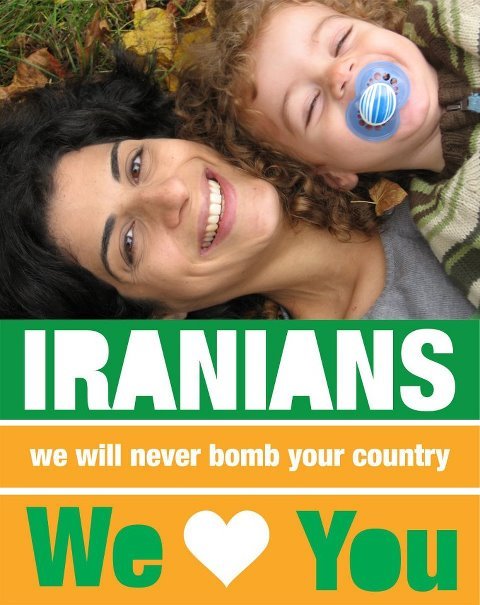
Love and Peace Campaign, from Israelis Osama Bin Laden cited opposition to U.S. military bases in Saudi Arabia as a main motive behind his group’s attacks on September 11th. So,another thought, for thoughts are merely dreams yet unfulfilled. If those people staying around the U.S.’ 750 overseas military bases said, peacefully, “No!” and compelled the Pentagon to close the bases, how many future tragedies might be averted?
We look at the 9 existing military bases in Afghanistan, intended to be kept for ‘exclusive’ U.S. military use through 2024 and beyond if the U.S./Afghan Bilateral Security Agreement is successfully pushed through under U.S. threats. You look at the naval base being constructed on Jeju Island which is named the World island of Peace, and what our senses and our understanding show us is a global 1% in government and corporations attempting to ‘comfort’ the 99% with claims that they care about our homes, our livelihoods, and our desire to live without wars, when in practice, they pursue profit and power at our expense.
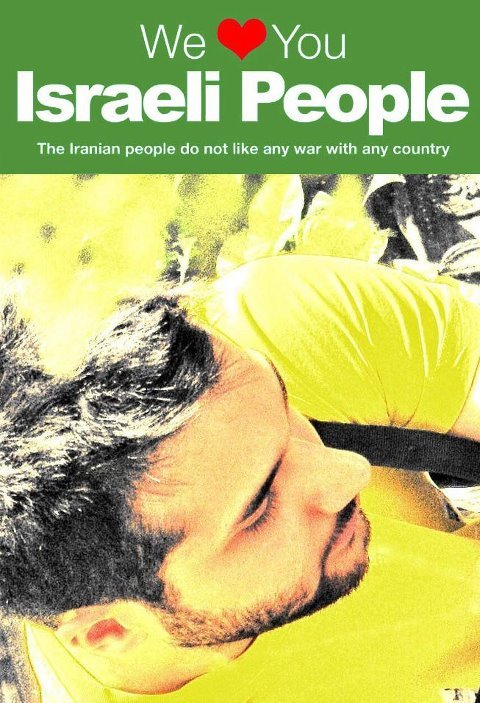
Love and Peace Campaign, from Iranians You see the Jeju shoreline being cordoned off as if to imprison the island, and one of you, Dr Park, used to swim along the shore every day to free it, until they put him behind bars, where he can’t swim. We see the bare, deforested land and hills of Afghanistan beneath its mountains, destroyed and neglected by nations insistent on waging wars.
You see the 16.5% poor of the ‘Dragon’ South Korean population, and a test-obsessed, economic-geared education system that has contributed to South Korea having the highest suicide rate among 31 OECD countries. We see labourers standing jobless in the streets of Kabul, some going back to makeshift houses to shiver in the autumn cold, and some resorting to drugs under the smelly, trash-packed river bridges.
You see soldiers, police, batons, shields. We see them everywhere too, even militarizing ‘humanitarian’ aid.
All of these sights make it so socially essential for us to remain friends, to stand and struggle together for a while or for a lifetime, free in our minds and hearts from borders, and free from the scourge of fear. That’s why the Afghan Peace Volunteers are petitioning for 2 Million Voices.
Beyond the U.S. military’s hopes of completing Jeju’s one naval base and Afghanistan’s nine are struggles by people in Okinawa, in Diego Garcia and on and on, people we commit to befriending across borders, persisting in building those person-to-person and community-to-community relationships so necessary to saving our world from militarism, from life as machines, from fear.

Gangjeong villagers and peace keepers including the international team 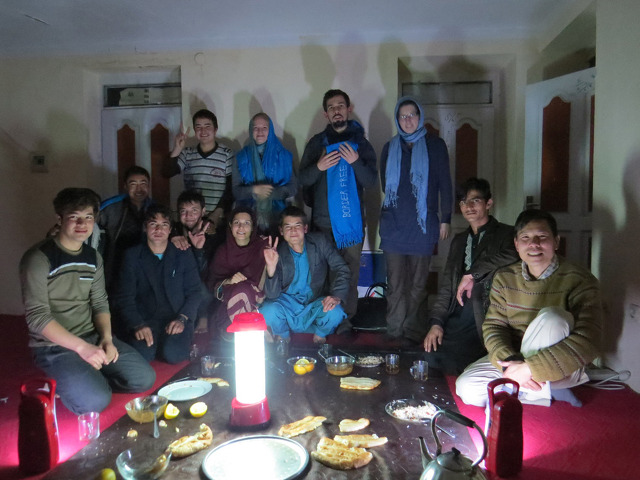
The Afghan Peace Volunteers with guests, and without electricity in Kabul Thank you for your work of love, and for speaking with me and Abdulhai, Ali, Raz Mohammad, Ghulamai, Faiz, Zekerullah and Baraththis past October.
We’ll have to keep in touch.
With human solidarity from Afghanistan,
Dr Hakim with the Afghan Peace Volunteers
http://globaldaysoflistening.org
-
Free Gangjeong’s Five Peace Prisoners!
Update: Dr. Song Kang-Ho was released on Nov. 29. Please see here. And Mr. Kang Bu-Eon was released on Dec. 3.
Regis Tremblay, a movie director of ‘The Ghosts of Jeju,’ thankfully made these images for the English speakers. Bruce Gagnon writes in his blog:
“These good people are right now languishing inside the jail house on Jeju Island, South Korea. And there are more on the way.
Their crime? Trying to non-violently block the construction vehicles from entering the Navy base “destruction” site in Gangjeong village. In the case of Yang Yoon-Mo he got an 18 month sentence. And many people are being given severe fines to pay.
One activist from Hawaii, who spent considerable time in Gangjeong village in solidarity with the villagers, has reported: “There is no heat for male prisoners (I do not know about the women’s section of the jail) during the frigid months of winter. The conditions are inhumane.”
We can’t ever forget these good people who are fighting for peace, the environment, and human rights. See more at the official Jeju web site Save Jeju Now.‘
# Among the five, Mr. Kang Bu-Eon is a village elder, who has spent lots of time in his childhood on the Gureombi Rock. He had taken care of his sick wife who fell down for a stroke eight years ago. He himself takes four medicines for illness.
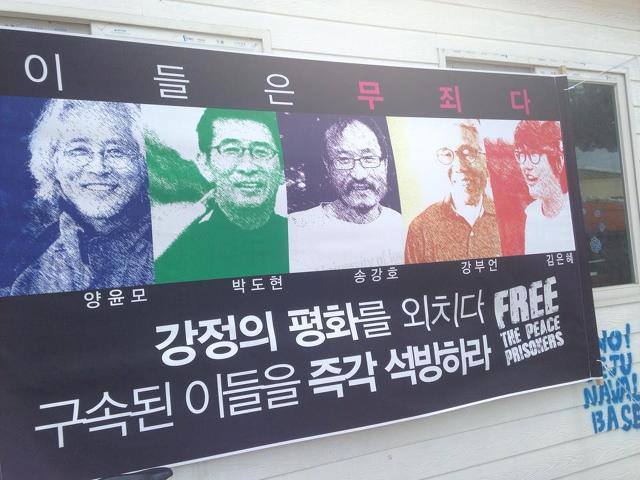
Banner image by Haku Kim/ photo by Choi Hye-Young. The banner reads, “these are no-guilty. Immediately release all the prisoners imprisoned for their crying for the peace of Gangjeong~”
-
An Irish Catholic Joining Protest Opposing Base
Re-blogged from here: The Irish Catholic, 2013. Irish Missionaries lead Korea military protest (Fwd by John Whipple). Though it does not necessarily reflect Save Jeju Now’s own view, the re-blogged article is helpful to glance on the degree of international solidarity opposing the Jeju naval base project. The role of Catholics worldwide, especially Irish Catholic’s, represented by Fr. Pat Cunningham, is remarkable.
Regarding the number of the Catholics in the village, Paco Booyah, a member of the Village International Team writes: ‘There are several villagers who are Catholics. But not many. Also because of the Catholics’ brave and strong actions, there are several villagers who have considering becoming catholic. There are more protestants than Catholics among the villagers though. And actually a majority of the villagers are Buddhist. Many villagers also believe traditional Jeju shamanism.’
Irish Missionaries lead Korea military protestReligious are leading efforts to prevent a military base on Jeju island, writes Siobhan Tanner
Religious who gathered for the anniversary Mass on Jeju.
Every day at 11 o’clock outside Gangjeong village on the spectacular coastline of Jeju island, a long line of cement trucks, serving the construction site for a military naval base, grinds to a halt. For the next hour none will enter or leave the compound.
Outside the six-metre high metal fence, their way is blocked by two priests in windblown white vestments. One, on rotation from an island parish – and one, a Jesuit, sent here for this cause – are holding Mass for about 20 protesters.
When the liturgy ends, the group spreads out, holding hands. They sing protest songs before they are drowned out by the sound of starting engines. The hour is up. The trucks, flanked by hundreds of police, army and private security (up to 600-strong, reports one observer) break forcibly and easily through the human chain, arresting some and scattering others.
This is the daily show witnessed by Colomban missionary, Fr Pat Cunningham, who has become increasingly radical since coming to South Korea in 1992.
Deportation
He has been threatened with deportation for protesting a massive military naval base on the pristine Unesco-protected island of Jeju, 50 kilometres south of the Korean peninsula. More than 130,000 police and army personnel have been sent to supress the opposition since 2011. “Surveillance is so huge down there and anyone who criticises the base is ‘red-brushed’ and labelled a North-Korean sympathiser in the mainstream press,” he tells The Irish Catholic from his mission house in Seoul.
Fr Cunningham is one of hundreds of priests and nuns who have placed themselves bodily in front of machines since the protests began in 2007.
Arms race
Donal O’ Keefe, head of the Colombans in Korea says they oppose the base because it is a threat to regional and world peace. “It is fuelling the arms race in Asia where South Korea is being used as a pawn in the Pacific where the USA and China are now confronting each other.”
The base will be a catastrophe for the Gangjeong environment and the livelihoods of the population living there; warship traffic is predicted to drive nine endangered species, including the bottle-nosed dolphin, towards extinction.
Due to be finished by primary contractors Samsung in 2014, the base will be contracted by the US to house 7,000 marines and 20 warships, including aircraft carriers, nuclear submarines and destroyers armed with ballistic missiles which will patrol the East China Sea.
Koohan Paik, campaign director of a forum on Globalisation’s Asia-Pacific programme says Jeju is just one island in a growing constellation of geostrategic points that are being militarised as part of President Obama’s ‘Pacific Pivot’, a major initiative announced late in 2011 to counter a rising China. According to separate statements by then Secretary of State Hillary Clinton and Defense Secretary Leon Panetta, 60% of US military resources are swiftly shifting from Europe and the Middle East to the Asia-Pacific region. (The United States already has 219 bases on foreign soil in the Asia-Pacific; by comparison, China has none.)
And though there are no Catholics among the 1,500 fishermen and farmers of Gangjeong village, the Church in Jeju has been at the forefront of struggle from the start.
Hunger strike
When the governor of Jeju (since ousted) agreed to accept the naval base on the island province in 2007, local priests went on a hunger strike and their bishop, Peter Kang U-il, wrote an open letter to South Korea’s president urging a referendum on the plan.
The Jesuits too waded into the battle early, sending priests from the mainland – four of whom were imprisoned for sentences ranging from one month to three.
Then, two years ago, the Church in Korea made a bold political move when clergy nationwide announced that they would engage in civil disobedience to halt construction of the site. More than 15 dioceses and several religious and justice organisations committed to fighting the naval base. After this, arrests of religious increased exponentially.
At the height of activity early last year – during the blasting and paving of Gureombi Rock, a one-kilometre basalt formation – 20 nuns and a priests, praying for peace outside the gate were arrested, while 13 Catholic priests went on trial for holding a Mass and sit-in protest.
Minor victories
The battle for Jeju has become a litany of minor victories and major defeats. When parliament halted funding for the project, in December of last year, pending an independent review, contractors Samsung continued construction using their own funds.
Law suits filed by villagers against the government have been dismissed by an allegedly hostile judiciary and environmental monitors report that once-pristine water sources have been contaminated while dredging has started to kill the underwater coral.
Meanwhile, the penal crackdown on activists has increased.
Three months ago, Brother Park Do-Hyun and Dr Sang Kang-Ho, members of Save Our Seas, were arrested while monitoring the dredging of the sea-bed which was being done without environmental protection measures.
Both men have passed 100 days in custody, awaiting sentence. Despite, these setbacks, the Catholic-led protests show no signs of diminishing.
At their two-year anniversary Mass in early October, hundreds of religious pledged to continue their non-violent actions in Gangjeong and again called for a stop to the construction.
“In our heart of hearts, maybe we know that we cannot stop it but we continue campaigning to raise awareness, to show the world what is happening,” says Fr Cunningham.
And to this end, the Save Jeju campaign has been successful. Despite a virtual blackout in the Korean and US media, activists have raised the profile of their struggle to the international stage, most recently adding the name Hollywood director Oliver Stone to a growing list of celebrities and famous commentators who have visited Gangjeong.
The Jeju campaign for Peace arrived in Ireland this month for the first time when Mayor Kang of Gangjeong – who himself was imprisoned for three months – spoke at the Frontline Defenders conference in Dublin.
– See more at: http://www.irishcatholic.ie/article/irish-missionaries-lead-korea-military-protest#sthash.Osd7LLh3.dpuf
…………………………………..
-
Fr. Bix and Monk Gilberto on Jeju Island!
See also
Video: FR. William “BIX” Bichsel, S.J. On His Jeju Trip
Video: Fr. Bix interviews Bishop Kang
……………………………….
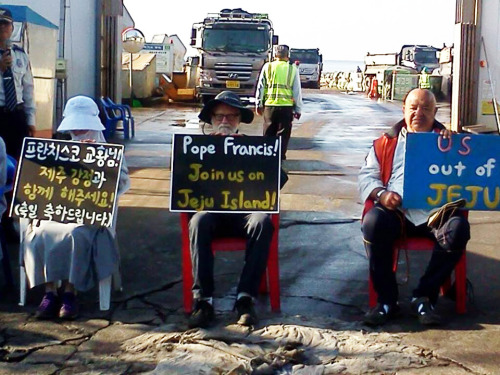
Source: PAX Christi USA, Oct. 31, 2013 Re-blogged from the blog of Disarm Now Plowshares, Oct. 1, 2013
(‘This is from an email written by Br. Gilberto Perez, a Nipponzan Myohoji Buddhist monk from Bainbridge Island, Washington, who accompanied Fr. Bix Bichsel to Jeju in September of this year. More writings from Bix and Gilberto in the attached link.’ By Leonard Eiger on Oct. 25, 2013)
Bix and Gilberto on Jeju Island!
Dear Friends,
In March 2012, at our yearly gathering of the Pacific Life Community, Dennis Apel of the Guadalupe Catholic Worker first introduced to PLC that US naval ships/subs were soon to be stationed on Jeju Island.
True to form of all actions and involvements the US is into and doesn’t want the American people to know about, don’t look for too much information about JeJu in the US press. These next two web sites can provide a lot of information most folks have no clue about.
You can see the photo’s Dennis took of his trip to Jeju on http://vpan.org/resources/Jeju-Island-of-Peace
Bix has been very focused on wanting to respond to the call of the religious and lay community on Jeju. Daily vigils and resistance actions have been in place for quite some time with the hope that one day the construction will end and this very dangerous American Funded Naval base 300 miles from mainland China will cease to be.
On September 23rd Bix, and Gilberto Perez flew from Seattle to Seoul Korea. They spent one day in Seoul and then directly onto Jeju. They have joined in with the resistance community on Jeju and the following reports give a lively report of his and Gilberto’s activities.
They are due back here in Seattle on the 8th of October. In the meantime the following are some thoughts from Bix and Gilberto.
****************************
Van-den-berg vigil September 26, 2013 From Bix
You would see and feel the holiness of this island; after returning from the regular daily practice of 100 bows (stand-kneel-deep bow) in front of a main gate of the construction site–with a view of the great sea beyond the site. The woman who started this deep bowing practice two years ago was there and today she was assisted by Gilberto and I, two Korean Notre Dame Sisters, a young woman from the US and two Korean women from Jeju. One of the ND Sisters said to me, “Your country has done this to us”!
Very much wish Steve Kelly and Louie Vitale would have been able to make this trip. Their life experience, and ability to absorb and appreciate another culture would be solidarity plus. We have been greatly welcomed by all Jesuits and well provided for and well scheduled.Fr. Kim,S.J. lives on Jeju Island in a small house rented by the Jesuit Order. He lives in community with two other Jesuits; one, Brother Pamk, is in jail for resistance to the naval base; the other, Fr. Lee is presently on trial for resistance activities. Fr. Kim has been jailed on different occasions for resistance. Jeju resistance and village -building is his assigned apostolate.
We began this day with Eucharist being celebrated at the gate leading into the construction site. We were four priests, five nuns, and four village women. The village men sat in chairs in front other main gate.
The police showed up in droves (high employment). When the time came for the construction trucks to enter the building site, the police surrounded us, asked us to leave, then carried all of us in our chairs to the sideline. Best chair- sedan ride ever. This happened four times. No arrests. Eucharist was being prayed and sung all the while. We all received communion.
September 27, 2013
We are living in Gangjeong Village here on Jeju Island and the village life is wonderful. Daily Eucharist and rosary is ended with high spirited Korean dance and song. We then have lunch in the community meal long-home. Fr. Kim had arranged for Gilberto and me to attend the ongoing investigative trials of Brother Park, S.J. (who lives in community with Fr. Kim) and Doctor Song who were being held in jail for their resistance work against the naval base.
Signs of community solidarity are clear to see; however, there is division also with some of the islanders. After the court visit Fr. Kim drove us to the hospital to visit a village woman resister who was struck many times by a villager who disagreed with the resistance. Though most of the people of Jeju Island and South Korea don’t want the base, there are those that support it.
This division was made manifest when the coordinator of the community meal hut was brought into the emergency room with multiple facial injuries while we were at the hospital. He had made a remark to a villager opposed to the resistance and the villager struck him in the face many times. Many members of the resistance community showed up and were very vocal in their opposition to the police, who were investigating the victim rather than the perpetrator. Sometime after midnight we left the hospital with Fr. Kim who drove us to our guest house.
 After the 100 bows, Eucharist and rosary, dancing and singing, and lunch in the community meal hut, we traveled to Jeju City to visit Brother Park, S.J. in jail. His spirit is strong and he is very alive and committed to his justice work.
After the 100 bows, Eucharist and rosary, dancing and singing, and lunch in the community meal hut, we traveled to Jeju City to visit Brother Park, S.J. in jail. His spirit is strong and he is very alive and committed to his justice work.I’m experiencing this time as a real retreat. The oneness of the Eucharist unifying all people in a live background stirs me. The signs of resistance and the dancing and singing give life and vibrancy to the Eucharist. What I’m experiencing is a church alive with a bishop calling for resistance.
September 29, 2013
Great conversations today with two Korean Jesuit Priest, each named Kim. This is the most alive and vibrant faith community I’ve ever experienced. Daily Eucharist is the foundation of the ongoing acts of resistance which also occur each day. Everyday priests, nuns and villagers sit in chairs blocking the main gate while the sung Eucharist up the road is being broadcast. After the Mass and rosary there is very vibrant Korean dance that knocks your socks off and fills you with joy. After this there is lively song. This is followed by Korean lunch—kim chi style- that is held
in the community meal house that has free and open meals every day. The atmosphere is light and alive with communication. At 7AM the day starts with a village lady who leads us in 100 deep down on your knees bows in front of the gate. Different blocking actions take place in the afternoon. Each order of nuns sends two nuns every week to vigil and resist. They stay in a guest house that is rented by the diocese. Four Jesuits are assigned to full time resistance work. The bishop is fabulous and calls villagers to resistance as well as assigning priests to work for peace.
At 4pm the bishop of Jeju will lead the Eucharist gathering in front of the main gate where Gilberto and I with other priests and nuns will block the gate. It is not yet clear to us but we are talking about an action on St.Francis day to call Pope Francis to join the opposition and resistance to the naval base at Jeju Island. However, today the regular resistance community expects hundreds to show up. Gilberto and I will be blocking all day.
More later—love Bix
*******************************
From: Gilbeto Perez September 29, 2013
Na Mu Myo Ho Ren Ge Kyo,
We bow hundred times in front of naval construction site with nuns and Fr. Bix. Very tough nuns, just like Sr. Junsan. Oliver Stone was here about a month ago and also prayed and bowed at local sacred location where US and Korea police massacred over 30,000 left wing peoples, mostly farmers and whole families, burned villages just like Vietnam..began 1946 ended in 1948. US called Jeju a “Red” island during this period. After freedom from Japanese, Koreans did not want another colonizer, therefore the arguments and massacre.

We all continue to pray. Yesterday and today over 75 Catholic nuns, 45 Jesuits and even the Bishop performed Sunday Mass. With over 300 local peoples and big dinner party at the village center. Reminds me of Cuba and Mexico where everyone in town is invited. Many of the nuns, priests and Bishop came from Seoul.Yes, Koreans are very passionate about peace and prayers, many studied in Berkeley, Boston and even the Philippines too. Two young Americans are here but not able to block gate, as they want to return to Korea. We sit in front of gate while Mass is said and police carry us off to let trucks and cars on/off the base and then we just return again. Police are thus far been pretty gentle. They remove us and lots of filming while this is performed, about five time each day.
Fr. Bix becomes like a young teenager when he is resisting the empire and very funny and happy with all…A baby Buddha.
Being near ocean means fresh fish and wonderful vegetables, cheese…No cows! Yes, US has taken the most beautiful location for the naval nuclear site, with approval of government (Eminent Domain) and destroyed the coral reed too.
So much to say about the Koreans, very respectful to elders and all participate in actions with joy and dancing after mass…I like the dancing in front of the gate the best.
Gassho, love to all and much peace, – Br. Gilberto
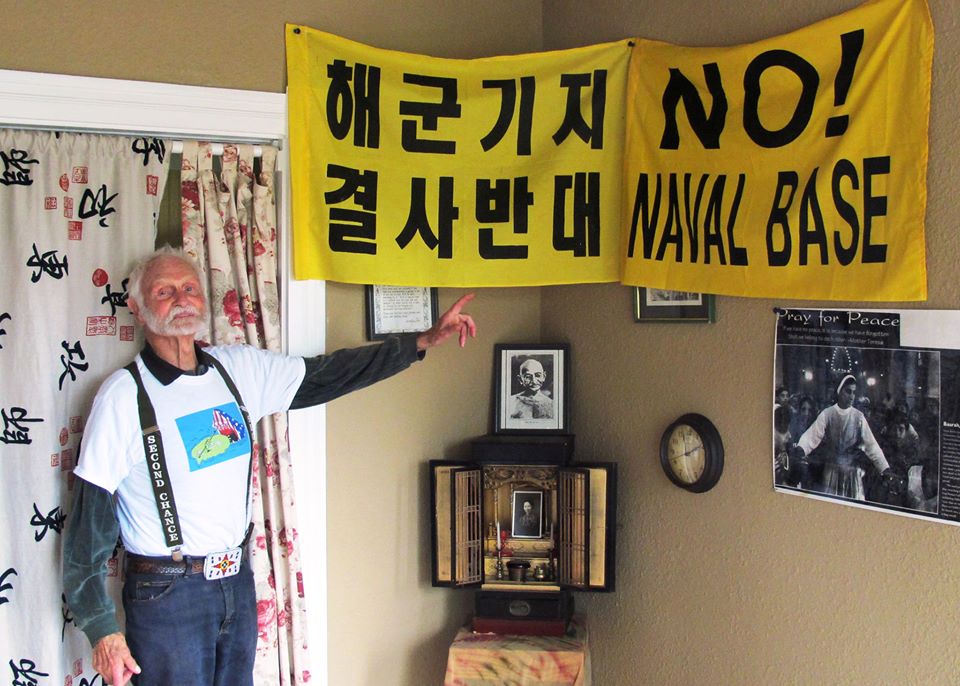
Photo by Leonard Eiger on Nov. 3/ “With Fr. Bichsel yesterday. Along with Br. Fred Mercy, we discussed and made plans to increase support here in Washington State for the people’s struggle for Jeju. Lots of good ideas! Now, to get more people here aware, educated and engaged in our common struggle.”
-
Statement by the Peoples Forum of Peace for Life, Jeju
Fwd by Pamela K Brubaker, Professor Emerita of Religion, California Lutheran University
To see the PFPL statement, ‘In Solidarity with Gangjeong Villagers Say No to the Jeju Naval Base!’ go to HERE.

Photo by Jo Yak Gol, Oct. 27, 2013 Affirming Life Together in the Face of Belligerent Empire
We the participants of the 3rd Peoples Forum of Peace for Life gathered at the April 3rd Peace Park in Jeju Special Self-Governing Province in the Republic of Korea from 23rd to 27th of October 2013. We had a women-led solidarity mission to Jeju and to Gangjeong Village, and shared common experiences of threats to life in our respective societies and throughout the world. Inspired by our faith traditions’ shared affirmation of life, we issue this call to solidarity and action.
In Solidarity with Gangjeong Villagers and Say No! to Jeju Naval Base
We note with concern that the government of the Republic of Korea has enforced a naval base construction in Gangjeong village, Jeju Island since 2007, without proper consultation with villagers and consideration of villagers’ right to environment, land and peace. We are distressed to witness how a large-scale development profiting big corporations can destroy peace in a village under the name of protecting national security. For seven years the people of Gangjeong village have resisted the base construction and suffered unjustly from abuse by authorities in response to their non-violent campaign against the construction of a naval base which will militarise the sea of East Asia. We witnessed the strong resistance of the historic tradition of Jeju women lived out in the Gangjeong village struggle against the base construction. They have been accompanied by activist groups from around the world. The Catholic Church, in particular, has been a presence for the last two years, offering mass every day to draw attention to this travesty.
We, the participants of the 3rd People’s Forum, stand in solidarity with the people of Gangjeong village in their peaceful struggle against maritime militarisation. Jeju people have a full right to resist the repeat of the last century’s tragedy, the April 3rd massacre in 1948 of tens of thousands of Jeju islanders. The people of Gangjeong village present a strong call to open a new era of peace and cooperation in East Asia for themselves and for all of us.
The Not-so-Innocent Language of Empire: Toward a Counter-Narrative
The emerging US national security state is a symptom of an increasingly desperate empire seeking to maintain its hegemony, harming the living conditions of many of its own and other peoples while repressing dissent at home and in politically “hot” regions. The imperial system wages war on the people of the world. It is defined by the nexus of the national security state and predatory corporate capitalism.
Beginning with the end of the Second World War, the US led imperial model has been imposed in several parts of the world, in Central and Latin America, the Middle East, Southeast Asia, and Africa. Key instruments of the imperial system are militarization and coups, capture of international financial and trade institutions, neoliberal market economy, and socio-cultural controls of media, communication, and education.
The Empire employs deceptive language and consciousness to legitimize its ambitions. In the solidarity mission to Jeju, we noted the ruthlessness of the innocent-sounding “US pivot to Asia.” Instead of increasing friendly relations with Asia, it involves the new geo-political imperatives of Empire regarding China and the American presence in this economically dynamic region.
Nuclear weapons and nuclear power are two dimensions of one reality, which the nuclear military industrial complex promotes and benefits from. There is no peaceful use of nuclear power (“Atoms for Peace”), as the disaster at Fukushima shows. Forced evacuation of 150,000 people continues, highly radioactive contaminated water has not been brought under control, and efforts to restart nuclear power plants are underway, as well as export of such plants.
The Empire claims to “fight terror”, “protect national security,” and “advance democracy and human and women’s rights.” These discourses of “Western” values advance imperial dominance. Activism for justice and peace is branded as “terrorism”, and Muslims resisting colonization and wars in their lands are termed terrorists. The imperial promotion of human and women’s rights has the opposite effect of what is proclaimed.
We need to expose the moral and political-intellectual bankruptcy of these imperial claims, and advance a counter-understanding of the threats to the lives of both the human- and non-human living world, as well as the life of the planet. We must offer alternative approaches in order to live justly, sustainably, and peacefully in this world.
Toward an Interfaith Praxis of Resistance to Empire
We are at a time when a global, powerful, and meaningful phenomenon like religion can no longer ignore the multiple crises surrounding it and catastrophically affecting its adherents. In particular, the “war on terror” has harmed Muslim-Christian relations in Africa, Asia and the Middle East. One of the most effective legitimating factors for the violence of the powerful in the world today is religion in general, and especially some powerful institutional actors located within the various religious traditions.
This trend needs to change and there are increasing voices which are calling on their religious leaders and communities to rekindle the real liberating spirit and ethos of their religious traditions. This is a time when all of the great, lively religious and spiritual traditions that provide fundamental values of justice, sustainability, and peace are under pressure to be co-opted by the powerful to support ongoing injustice and inequality in the world.
We meet here to affirm that these traditions must have no tolerance for the widespread, unfolding genocide taking place against the world’s peoples, and the concomitant ecocide of our home, planet Earth. The peoples of the world are suffering layer upon layer of injustice and brutality, and our religious and spiritual communities can no longer maintain their silence or just pay lip service to justice and peace. These communities must continue their prophetic and authentic missions of forcefully challenging the empire and its powerful allies, institutions, and policies and practices – in cooperation with like-minded social movements and peoples movements. We call upon our religious and spiritual communities to commit their leadership, constituencies, and resources to mobilize against these trends of domination, subordination, and destruction of peace-loving peoples, societies, and our ecosphere.
Our Common Call
We continue to be inspired by the heroic resistance waged by social movements in Latin America, the Philippines, India and many other places against neoliberalism and US hegemony, and call for meaningful support for and solidarity with these progressive forces.
Inspired by the long history of ecumenical witness for improved North-South Korean relations, particularly between the two Christian communities, we offer our solidarity to a reinvigorated process of dialogue and exchange with a view to generating a political environment conducive for reunification, beginning withrenewed engagement between the two sides to turn the Armistice into a peace treaty.
We urge resistance to financial instruments and trade agreements, such as the Trans-Pacific Partnership, which undermine our commitment to place people and the environment before profit.
We strongly condemn the corporate violence leashed out in Odisha, India, on the struggling communities and the environment by the POSCO company hand-in-glove with the Indian government. We demand the immediate release of people who are arrested and accused on fabricated cases. We demand the withdrawal of POSCO so that the communities can live in peace with nature. We ask the people of Gangjeong village in Jeju and other citizens of Republic of Korea to be in solidarity with the people in Odisha, India.
We call on people of faith and conscience to continue their support of the Arab people’s resistance against tyranny and occupation, and to oppose the regional and global counter-revolutionary political actors denying their aspirations for human dignity and social justice. We especially reaffirm the need for steadfast support for Palestinian national liberation and maintain our commitment to our Palestine solidarity work.
We call on the faith communities to actively combat the rising tide of Islamophobia, which facilitates greater imperial violence against Muslims.
We strongly denounce the growing network of the U.S. military power both through building bases and expanding access through Visiting Forces and Status of Forces Agreements throughout the world, including here in the Republic of Korea, and the accompanying patriarchal and sexual violence, exploitation, and suffering inflicted on women. We are inspired by and give our unconditional solidarity to the heroic resistance waged by women against such barbarism.
We deplore the state and private financing of bloated military budgets and the arms trade, and call for significant reduction in military expenditures and an end to the arms trade, so that these funds may be invested in life affirming programs.
We call on religious communities and peoples committed to peace to condemn the introduction and use of drone warfare, and demand an end to their use.
We affirm movements against nuclear power plants in Japan, India, and many other countries, and support their efforts to hold accountable governments and corporations for harm they have caused.
We call on the peoples of the nuclear armed states and those states protected by them to join with the 124 nations resolving to never use nuclear weapons.
We strongly encourage equitable negotiations between the US and Iran with a view to additional subsequent agreement on the imperative of establishing a Nuclear-Weapon-Free Zone in the Middle East. We affirm that establishing similar zones in South Asia and Northeast Asia is also urgent.
We remain committed to our critique of global injustices and global hegemony, although this in itself does not offer an alternative to the prevailing world order. Alternative structures, institutions, laws and policies must be premised upon an all-embracing alternative consciousness which privileges attitudes and values that the Empire has hitherto ignored or downplayed. Love, for instance, should be foregrounded as a defining attribute of the individual and collective consciousness of the human family. When love begins to shape our behaviour and action in a profound manner, it will have a huge impact upon all spheres of society including economics and politics. For love has the potential to demolish ego-centric attitudes that boost the insane drive for power and wealth that often leads to hegemony.
Adopted 27 October 2013
Jeju April 3 Peace Park, Republic of Korea
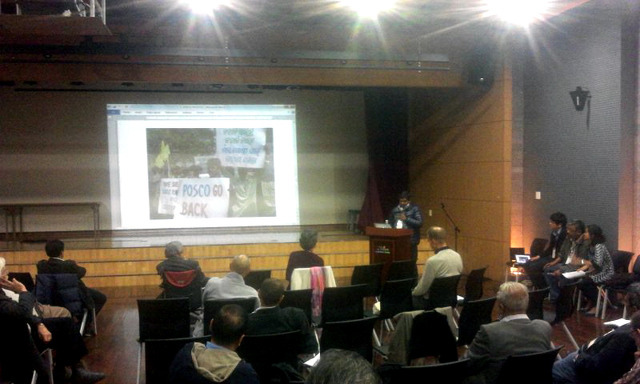
An Indian activist presents on the ‘corporate violence leashed out in Odisha, India, on the struggling communities and the environment by the POSCO company hand-in-glove with the Indian government.
You can see a video presented by him, here. To be co-incident, POSCO is another main company for the Jeju naval base construction. See here. For the two presented videos on people’s struggle opposing the POSCO, see here and here.
-
Gangjeong Goes to the World Council of Churches 10th Assembly in Busan, Korea
From October 30 until November 8, The World Council of Churches (WCC) will hold its every 7-years global assembly in Busan on the southern tip of the mainland of Korea.
According to the WCC website:
“The WCC brings together churches, denominations and church fellowships in more than 110 countries and territories throughout the world, representing over 500 million Christians and including most of the world’s Orthodox churches, scores of Anglican, Baptist, Lutheran, Methodist and Reformed churches, as well as many United and Independent churches. At the end of 2012, there were 345 member churches.”
And regarding the assembly:
“The assembly is the highest governing body of the World Council of Churches (WCC), and meets every seven years. It is a moment when the fellowship of member churches comes together as a whole in prayer and celebration.
The assembly has the mandate to review programmes, to issue public statements and determine the overall policies of the WCC, as well as to elect presidents and a Central Committee that oversees the council’s work until the next assembly.
Along with the WCC member churches, partner organizations and other churches have a strong presence at the event. This makes an assembly of the WCC the most diverse Christian gathering of its size in the world. It is a unique opportunity for the churches to deepen their commitment to visible unity and common witness so that world may believe.
The WCC was established at its 1st Assembly in Amsterdam, Netherlands (1948). Since then assemblies have been in held in Evanston, United States (1954); New Delhi, India (1961); Uppsala, Sweden (1968); Nairobi, Kenya (1975); Vancouver, Canada (1983); Canberra, Australia (1991); Harare, Zimbabwe (1998); and Porto Alegre, Brazil (2006).
The theme of the 10th Assembly is: “God of Life, lead us to Justice and Peace” . Which as you can see is a very good theme for a village like Gangjeong, known as the Life and Peace Village, which is struggling for Justice. With this in mind. Gangjeong Village and its supporters will have a presence at this years WCC.
As you can see in the above graphic. There will be both a Madang Workshop and an Exhibition Booth.
Madang Workshop:
The Workshop will take place on Wednesday, November 6 from 2:15-3:45 p.m. It is called, Inter-Island Solidarity for Peace: Establishing Peace Against maritime Militarization.
This is workshop will be a discussion about strategies, failures and successes of anti-militarism and anti-base movements. The main focus is on building a better and stronger network between islands who are suffering similar injustices. Guest speakers will be joining from Jeju, Okinawa, the Philippines, Hawaii, and Lanyu (in Taiwan). We are hoping that many other islanders and people struggling against unwanted military bases and land seizures will join as for the discussion as well.
Exhibition Booth:
We will also have a booth for the duration of the WCC assembly from morning until evening. It is Booth #50. It is in the blue section under the name “Gangjeong Village Association”. There will be pictures, displays, videos, brochures, newsletters, postcards, books, handicrafts, and friendly people.
If you are at the WCC Assembly in Busan, please come by our booth and also think about joining our workshop!
Open Letter to the WCC:
Finally and perhaps most importantly, the Gangjeong Village Association, The Jeju Pan-Island Committee for Stop of Military Base and for Realization of Peace Island, and The National Network of Korean Civil Society for Opposing to the Naval Base in Jeju Island have issued an open letter calling for the World Council of Churches to issue a public statement for peace against Asia-Pacific maritime militarisation. The letter is reproduced below and also can be found at this link. Please spread this to anyone you know who might have connections with the WCC or is attending this assembly:
Calling for the Issue of a Public Statement for Peace against Asia-Pacific Maritime Militarization:
“Guide our feet into the way of peace” (Luke 1:79)
We are writing to urge the delegates of Member Churches of the World Council of Churches (WCC) to seriously consider issuing a public statement on building peace in the Asia-Pacific against maritime militarization. Today, we are witnessing a rise of militarism under the name of peace and prosperity in the Asia-Pacific. Tension between the economic and military expansion of China and the corresponding the U.S. “Asian Pivot” strategy has sparked an escalation in the war-profit industry and an arms race for global military dominance. This has left in its wake conflict and suffering, and the destruction of land, cultures, and traditions across the Asia-Pacific. These false idols of security and economic expansion runs counter to the justice, peace, and life that are the core values of the World Council of Churches and Christians everywhere.
A key example of the impact of this militarization can be seen in Gangjeong Village, Jeju Island, Republic of Korea. One of the oldest and most naturally beautiful villages of Jeju, the unique eco-systems of Gangjeong are a showcase of God’s creative spirit, home to numerous endangered species and the world’s largest temperate soft coral forest. Since 2007, without the villagers’ consent, it has become the site of massive naval base construction. If built, the Jeju naval base will be a critical outpost of the ROK-Japan-U.S. maritime military alliance targeting China. As a result, Jeju, ironically known as “the Island of Peace”, will become a primary target, leading to devastating loss of life and destruction.
Dedicated to the care of creation and the spread of life, the struggle against the base in Gangjeong is an open and truly ecumenical/inter-faith resistance for justice. Catholics, Protestants, Quakers, Anabaptists, Buddhists, and Shamanists have come together to create a vital community, marked by vibrant practice of faith and respect for different traditions without dilution or conflict. Despite police crackdowns on religious expression and assembly, Catholic priests hold daily mass in front of the construction site, Protestants have prayer services, and Shamans perform traditional rituals. The ingredients that hold it all together are a steadfast desire for God’s justice, a dream of life together, and a commitment to nonviolent peacemaking. We hope that the struggle against the Jeju naval base construction, which is a microcosm of the maritime militarization of the Asia-Pacific, can be a call to Christians and all people of God to return to the path of peace.
It is now urgent for churches to respond to the escalating maritime militarization and violence in the Asia-Pacific region that runs counter to the call of the people of God to peacemaking. As mentioned in an “Ecumenical Call for Just Peace,” churches should become builders of a culture of peace while recognizing the promise of peace is a core value of all religions. The farmers of Gangjeong Village on Jeju Island are at the forefront of such a faithful realization of the Kingdom of God. Let’s not turn their plowshares into swords.
Therefore, we call upon the World Council of Churches to:
• Issue a public statement at the 10th Assembly of World Council of Churches, formally expressing its grave concern regarding maritime militarization in the Asia-Pacific which is a threat to regional and global just peace;
• Urge the government of the Republic of Korea to stop the Jeju naval base construction and focus on peaceful approaches to cooperation;
• Call upon the government of the Republic of Korea to protect and promote all human rights including the right to peace and environment of the people of Gangjeong Village;
• Appeal to the churches and national ecumenical councils in the region to take serious measures to stop the arms race and make the Pacific the Sea of Peace.
Yours Sincerely,
Mr. Dong-Kyun Kang / Ms. Young-hee Jeong
Village Mayor / Chairwoman
Gangjeong Village Association / Village Women’s CommitteeMr. Gi-Ryong Hong / Ms. Ri-ri Hong
Co-convenor / Co-convenor
Jeju Pan-Island Committee for Stop of Military Base and for Realization of Peace IslandMr. Taeho Lee / Ms. Hye-ran Oh
Co-convenor / Co-convenor
National Network of Korean Civil Society for Opposing to the Naval Base in Jeju Island* Contact Details:
Ms. Gayoon Baek, National Network of Korean Civil Society for Opposing to the Naval Base in Jeju Island, gayoon@pspd.org
Mr. Paco Michelson, Gangjeong International Team, gangjeongintl@gmail.comPlease spread the word, come join us at the WCC Assembly in Busan, and thanks for your support!



